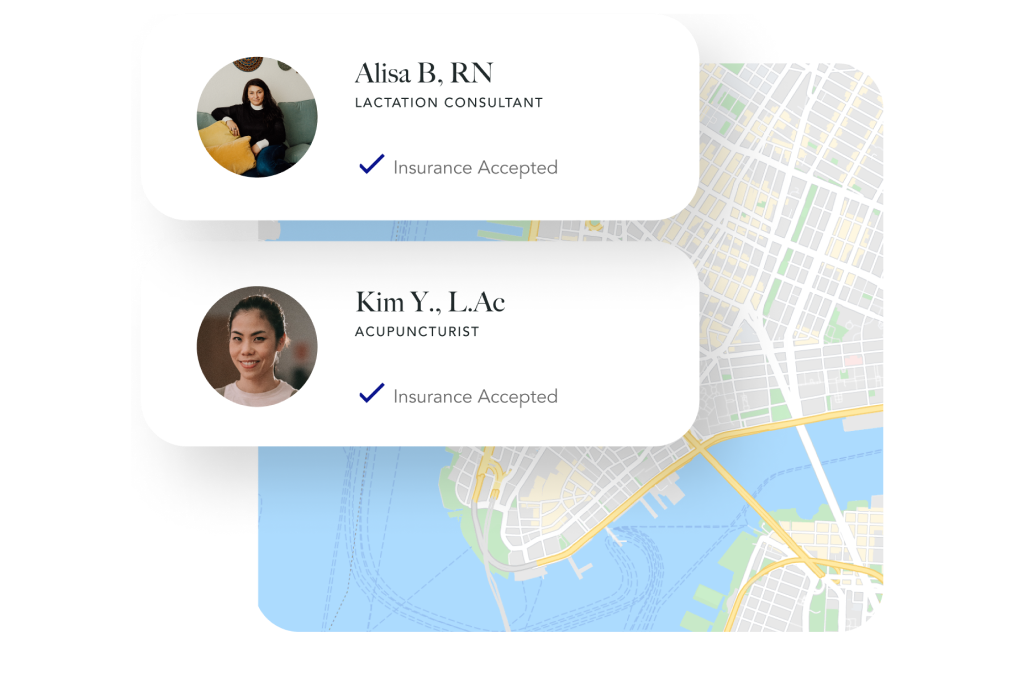
Our Specialties
Find IBD Nutritionists for Crohn’s & Colitis Help Near Me
90% of Zaya patients pay $0 for one-on-one nutrition counseling with a registered dietitian.
Find An IBD Nutritionist for Crohn’s & Colitis Help Near MeBrowse our directory of IBD nutritionists — and book your visit online using your insurance.

Find the right care for you.

Pay with your insurance.

Book your visit online.
Get a provider who gets you.
Our providers are nutrition experts and take the time to get to know you and your needs.
Real talk from real patients.
Have questions? We’ve got answers.
For more information about how Zaya works, check out our frequently asked questions.
View FAQsMore about IBD: Crohn’s & Colitis & our nutritionists
What is IBD?
Inflammatory bowel disease (IBD) is a chronic illness characterized by inflammation of the digestive tract. It refers to a group of disorders that primarily include Crohn’s disease and ulcerative colitis.
These conditions cause persistent inflammation and damage to the gastrointestinal tract, leading to various symptoms and complications.
What is Crohn’s Disease?
Crohn’s disease is a type of inflammatory bowel disease that can affect any part of the digestive tract, from the mouth to the anus. It involves chronic inflammation that extends through the entire thickness of the affected bowel wall.
Crohn’s disease is characterized by periods of flare-ups and remission, and common symptoms include abdominal pain, diarrhea, fatigue, weight loss, and reduced appetite. In addition to gastrointestinal symptoms, Crohn’s disease can also cause complications such as ulcers, fistulas, strictures, and nutritional deficiencies.
>> Learn more: Crohn’s Disease Diet Plan: Foods to Eat & Avoid
What is Colitis?
Colitis refers to inflammation of the inner lining of the colon (large intestine) and rectum. The most common type is ulcerative colitis. Ulcerative colitis causes inflammation and ulcers in the innermost lining of the colon and rectum.
Symptoms of ulcerative colitis include abdominal pain, rectal bleeding, diarrhea (often with blood or pus), urgency to have a bowel movement, and an inability to empty the bowels completely.
The severity and extent of inflammation can vary among individuals, ranging from mild to severe cases that may require medical intervention.
>> Learn More: Best Ulcerative Colitis Diet Plan: Best Foods, Foods for Flare-Ups, & More
What causes IBD?
The precise cause of inflammatory bowel disease (IBD) remains uncertain, but it is believed to arise from a combination of factors primarily involving an abnormal immune response. Some potential causes of IBD include:
- Immune system dysfunction. In IBD, the immune system mistakenly identifies normal substances in the gastrointestinal tract as foreign invaders, triggering an inflammatory response. This immune system malfunction leads to chronic inflammation and damage to the digestive tract.
- Environmental triggers. Environmental factors such as certain viruses, bacteria, or other microorganisms may play a role in triggering an abnormal immune response. These triggers can cause inflammation in the gastrointestinal tract, contributing to the development of IBD.
- Genetic predisposition. There appears to be a genetic component to IBD. People with a family history of IBD are at a higher risk of developing the condition. Specific genes related to the immune system and inflammation regulation may contribute to the development of IBD.
What are the symptoms of IBD?
The symptoms of inflammatory bowel disease (IBD) can vary in intensity and location leading to a wide range of manifestations. The severity of symptoms can fluctuate, with periods of active illness followed by periods of remission.
Both Crohn’s disease and ulcerative colitis, the two main types of IBD, share several common signs and symptoms which may include:
- Diarrhea. Persistent diarrhea is a hallmark symptom of IBD. It can range from mild to severe and may be accompanied by urgency and an increased frequency of bowel movements.
- Fatigue. Chronic fatigue and a general feeling of tiredness are common in individuals with IBD. The underlying inflammation and nutrient deficiencies associated with the condition can contribute to fatigue.
- Abdominal pain and cramping. Recurrent abdominal pain and cramping are frequent symptoms of IBD. The pain can be localized or spread throughout the abdomen, and it may worsen during flare-ups.
- Blood in the stool. Bloody or tarry stools are characteristic of IBD. The presence of blood may vary, ranging from visible blood in the stool to blood that is only detectable through laboratory tests.
- Reduced appetite. Many individuals with IBD experience a decrease in appetite. This can be due to the inflammation in the digestive tract as well as the associated discomfort and pain.
- Unintended weight loss. Unexplained weight loss is often observed in people with IBD. It can result from a combination of factors, including reduced appetite, malabsorption of nutrients, and increased energy expenditure due to the body’s immune response.
What are the risks of IBD?
Untreated inflammatory bowel disease (IBD), such as Crohn’s disease and ulcerative colitis, can lead to various risks and complications. Here are some of the potential risks associated with untreated IBD:
- Intestinal damage. Chronic inflammation in the gastrointestinal tract can lead to severe damage, including ulcers, strictures (narrowing of the intestines), and fistulas (abnormal connections between different parts of the digestive tract). These complications can cause bowel obstructions and impair the normal functioning of the intestines.
- Malnutrition and nutrient deficiencies. Inflammatory bowel disease can interfere with the absorption and digestion of nutrients, leading to malnutrition and deficiencies in essential vitamins, minerals, and proteins.
- Increased risk of colorectal cancer. Individuals with long-standing and extensive ulcerative colitis have an increased risk of developing colorectal cancer. Regular monitoring and surveillance of the colon through colonoscopies are essential to detect any precancerous changes or early signs of cancer.
- Perforation or abscess formation. In severe cases of IBD, the inflammation can weaken the intestinal walls increasing the risk of perforation or the formation of abscesses.
- Strictures and bowel obstructions. Long-term inflammation in Crohn’s disease can cause scar tissue formation and narrowing of the intestines, leading to strictures. These strictures can result in bowel obstructions, causing abdominal pain, bloating, and changes in bowel habits.
- Extraintestinal manifestations. IBD can affect other parts of the body, leading to extraintestinal manifestations such as arthritis, skin disorders, eye inflammation, liver problems, and osteoporosis.
When to see an IBD dietitian
When living with IBD, seeking the guidance of a dietitian can be beneficial in managing symptoms and optimizing nutritional intake. These specialized dietitians have extensive knowledge of IBD and its impact on the digestive system.
They can provide personalized guidance tailored to the unique needs and challenges faced by individuals with IBD. Here are some indications that may suggest the need to work with an IBD dietitian:
- Newly diagnosed with IBD. If you have recently been diagnosed with IBD, collaborating with an IBD dietitian can help you understand the dietary modifications and strategies that can support your condition from the start.
- Struggling with nutrition-related symptoms. If you experience significant weight loss, malnutrition, nutrient deficiencies, or have difficulty managing symptoms such as diarrhea, abdominal pain, and bloating, an IBD dietitian can provide targeted nutritional interventions to address these concerns.
- Need for specialized dietary plans. Individuals with IBD may require specific dietary plans to manage their condition effectively. If you require a customized meal plan, assistance with food choices, or guidance on implementing a specialized diet such as low residue, low FODMAP, or elemental diet, an IBD dietitian can provide the necessary support.
- Limited food tolerance or dietary restrictions. If you have identified certain trigger foods that worsen your IBD symptoms or if you have additional dietary restrictions or allergies, an IBD dietitian can help you develop a well-balanced and nutritious meal plan while avoiding potential triggers.
- Preparing for surgery or undergoing treatment. If you are scheduled for surgery or undergoing medical treatments such as immunosuppressive therapy or biologic medications, an IBD dietitian can assist in optimizing your nutrition to support healing, manage side effects, and enhance treatment outcomes.
Note that Zaya Care’s nutritionists can also help with nutrition for other colitis issues, such as creating a microscopic colitis diet.
How Zaya Care’s IBD dietitians can help
When working with an IBD dietitian, you can expect personalized care and support tailored to your specific needs and goals. The first appointment typically involves a comprehensive assessment of medical history, symptoms, dietary habits, and lifestyle factors.
Based on this assessment, the dietitian develops a customized nutrition plan addressing dietary needs, food preferences, and IBD-related symptoms. Follow-up appointments allow for progress review, plan adjustments, and addressing any questions or concerns.
The dietitian serves as an educator, helping you understand your condition and providing practical strategies for implementing dietary changes. By working with an IBD dietitian, you will gain the tools and support to make informed decisions, improve symptom management, and enhance your quality of life.
>> Printable ulcerative colitis diet plan PDF
Benefits of working with a Zaya Care IBD dietitian
Working with a Zaya Care IBD dietitian offers numerous benefits for individuals with inflammatory bowel disease (IBD). These specialized professionals understand the unique nutritional needs and challenges associated with IBD and provide personalized guidance tailored to each individual’s specific requirements, symptoms, and treatment plan.
One of the key advantages of working with a Zaya Care IBD dietitian is their expertise in IBD-related nutrition. They can offer evidence-based advice on managing symptoms such as diarrhea, abdominal pain, and reduced appetite through dietary modifications and meal planning.
Zaya Care IBD dietitians provide ongoing support to individuals, helping them optimize their nutrient intake, manage weight changes, and address specific dietary concerns associated with IBD.
By collaborating closely with their clients, these dietitians empower them to take an active role in their nutritional health, make informed decisions, and improve their overall well-being throughout their IBD journey.




